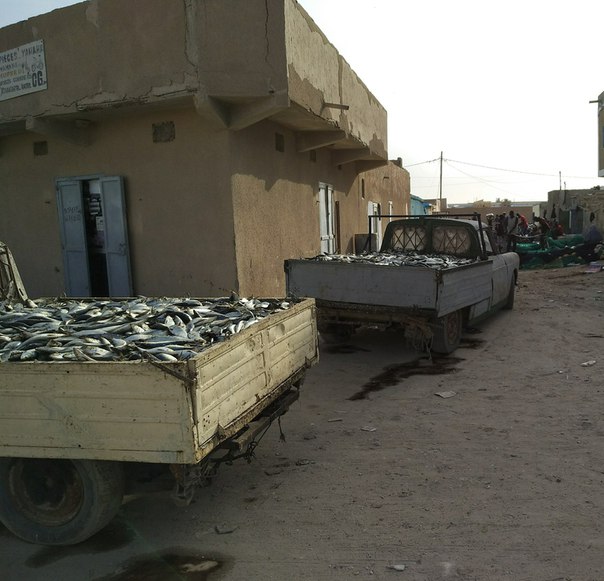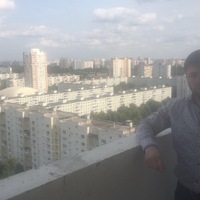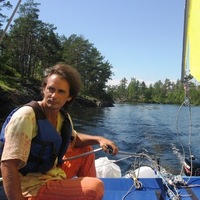Нуадибу или "Логово шакала" очень интересный город.
Ощущение такое, что взяли африканское население из начала 19 века и вместе с козами и повозками перенесли их в век 21. В свежеотстроенный в прошлом столетии город - порт Нуадибу.
С одной стороны, масса черножих, рабочих порта, явно горожан в первом поколении, козы и коровы пасущиеся и едящие мусор на улице, водовозы на осликах, а с другой, кабаки с портовыми шлюхами.
Здесь в Нуадибу, очень сильно ощущается Чёрная Африка. Арабо-берберы присутствуют,но визуально их меньше. Они ,как известно, правящий класс и вряд ли будут работать в порту и ездить на ослике воду продавать.
По городу, всюду запах тухлой рыбы, грязь и отсутствие улиц.
Я думаю, что местным город ,как структура, не нужен. Во всяком случаев пока.
Напомню, Мавритания одна из самых бедных стран мира, из-за почти непрекращающийся много лет засухи, сотни тысяч мавританских кочевников и скотоводов остались без средств к существованию. Многие арабо-берберы были вынуждены отпустить чернокожих рабов, ибо просто не могли их прокормить - на себя еле хватало. И вся эта публика хлынула в города, которых всего четыре, а на самом деле три. И занятий , глобально, три - порты в Нуадибу и Нуакшоте и руда в Зуэрате. Вот и получилась стихийная урбанизация населения. В особенности из низших каст. Вообщем, пасмурно здесь.
А ведь когда-то , именно в Нуадибу (тогда Порт Этьен) молодой французский лётчик написал книгу, ставшую классикой - "Планета людей".
Ощущение такое, что взяли африканское население из начала 19 века и вместе с козами и повозками перенесли их в век 21. В свежеотстроенный в прошлом столетии город - порт Нуадибу.
С одной стороны, масса черножих, рабочих порта, явно горожан в первом поколении, козы и коровы пасущиеся и едящие мусор на улице, водовозы на осликах, а с другой, кабаки с портовыми шлюхами.
Здесь в Нуадибу, очень сильно ощущается Чёрная Африка. Арабо-берберы присутствуют,но визуально их меньше. Они ,как известно, правящий класс и вряд ли будут работать в порту и ездить на ослике воду продавать.
По городу, всюду запах тухлой рыбы, грязь и отсутствие улиц.
Я думаю, что местным город ,как структура, не нужен. Во всяком случаев пока.
Напомню, Мавритания одна из самых бедных стран мира, из-за почти непрекращающийся много лет засухи, сотни тысяч мавританских кочевников и скотоводов остались без средств к существованию. Многие арабо-берберы были вынуждены отпустить чернокожих рабов, ибо просто не могли их прокормить - на себя еле хватало. И вся эта публика хлынула в города, которых всего четыре, а на самом деле три. И занятий , глобально, три - порты в Нуадибу и Нуакшоте и руда в Зуэрате. Вот и получилась стихийная урбанизация населения. В особенности из низших каст. Вообщем, пасмурно здесь.
А ведь когда-то , именно в Нуадибу (тогда Порт Этьен) молодой французский лётчик написал книгу, ставшую классикой - "Планета людей".
Nouadhibou or "The Jackal's Den" is a very interesting city.
The feeling is that they took the African population from the beginning of the 19th century and, together with goats and carts, transferred them to the age of 21. To the city of Nouadhibou, which was newly built in the last century.
On the one hand, there are a lot of blacks, workers of the port, obviously first-generation citizens, goats and cows grazing and eating garbage in the street, water carriers on donkeys, and on the other, taverns with port whores.
Here in Nouadhibou, Black Africa is felt very strongly. Arab-Berbers are present, but visually less. They are known to be the ruling class and are unlikely to work in the port and ride a donkey to sell water.
In the city, everywhere the smell of rotten fish, dirt and lack of streets.
I think that the local city as a structure is not needed. In any case, for now.
Let me remind you that Mauritania is one of the poorest countries in the world, because of the almost incessant drought for many years, hundreds of thousands of Mauritanian nomads and pastoralists were left without means of subsistence. Many Arab-Berbers were forced to let go of black slaves, because they simply could not feed them - they barely had enough of themselves. And all this public has rushed into the cities, of which there are only four, and in fact, three. And globally, there are three occupations - ports in Nouadhibou and Nouakchott and ore in Zouerate. So it was a spontaneous urbanization of the population. Especially from the lower castes. In general, overcast here.
But once, it was in Nouadhibou (then Port Etienne), a young French pilot wrote a book that became a classic - "Planet of the People".
The feeling is that they took the African population from the beginning of the 19th century and, together with goats and carts, transferred them to the age of 21. To the city of Nouadhibou, which was newly built in the last century.
On the one hand, there are a lot of blacks, workers of the port, obviously first-generation citizens, goats and cows grazing and eating garbage in the street, water carriers on donkeys, and on the other, taverns with port whores.
Here in Nouadhibou, Black Africa is felt very strongly. Arab-Berbers are present, but visually less. They are known to be the ruling class and are unlikely to work in the port and ride a donkey to sell water.
In the city, everywhere the smell of rotten fish, dirt and lack of streets.
I think that the local city as a structure is not needed. In any case, for now.
Let me remind you that Mauritania is one of the poorest countries in the world, because of the almost incessant drought for many years, hundreds of thousands of Mauritanian nomads and pastoralists were left without means of subsistence. Many Arab-Berbers were forced to let go of black slaves, because they simply could not feed them - they barely had enough of themselves. And all this public has rushed into the cities, of which there are only four, and in fact, three. And globally, there are three occupations - ports in Nouadhibou and Nouakchott and ore in Zouerate. So it was a spontaneous urbanization of the population. Especially from the lower castes. In general, overcast here.
But once, it was in Nouadhibou (then Port Etienne), a young French pilot wrote a book that became a classic - "Planet of the People".








У записи 35 лайков,
0 репостов,
797 просмотров.
0 репостов,
797 просмотров.
Эту запись оставил(а) на своей стене Леонид Ланда
























































